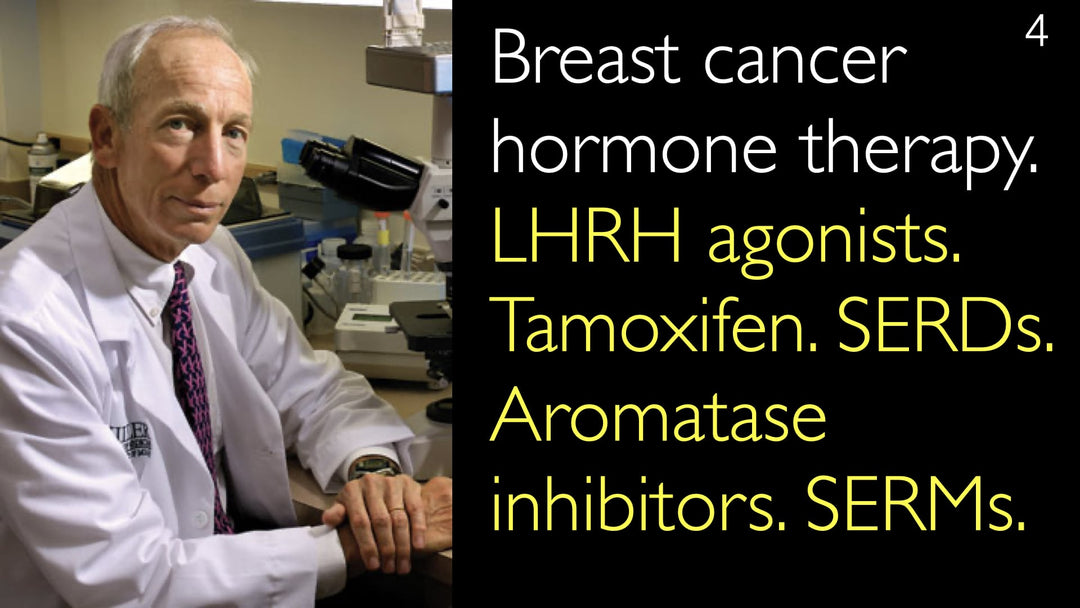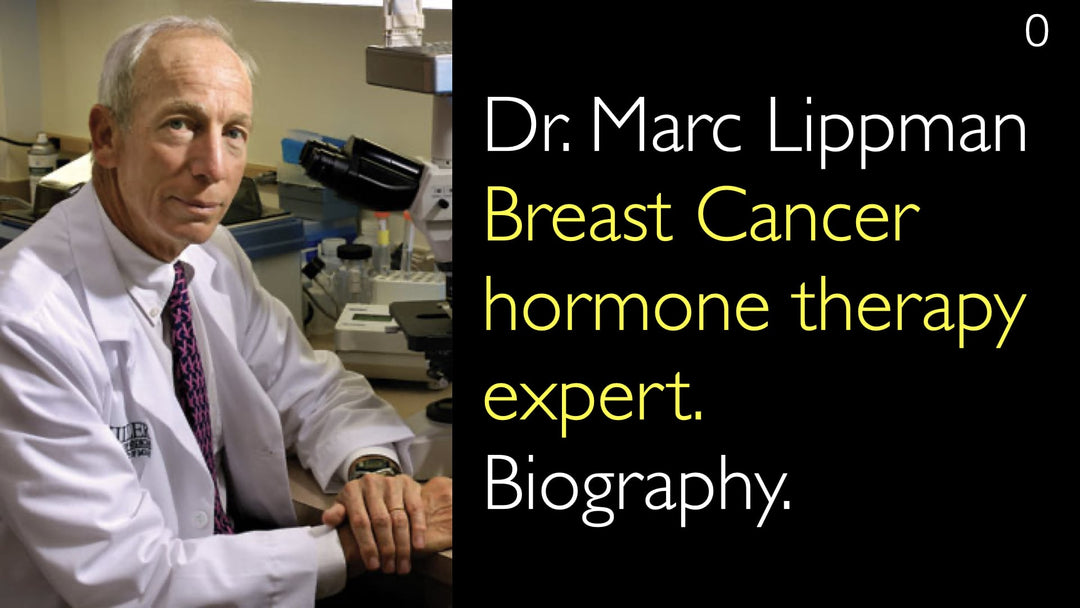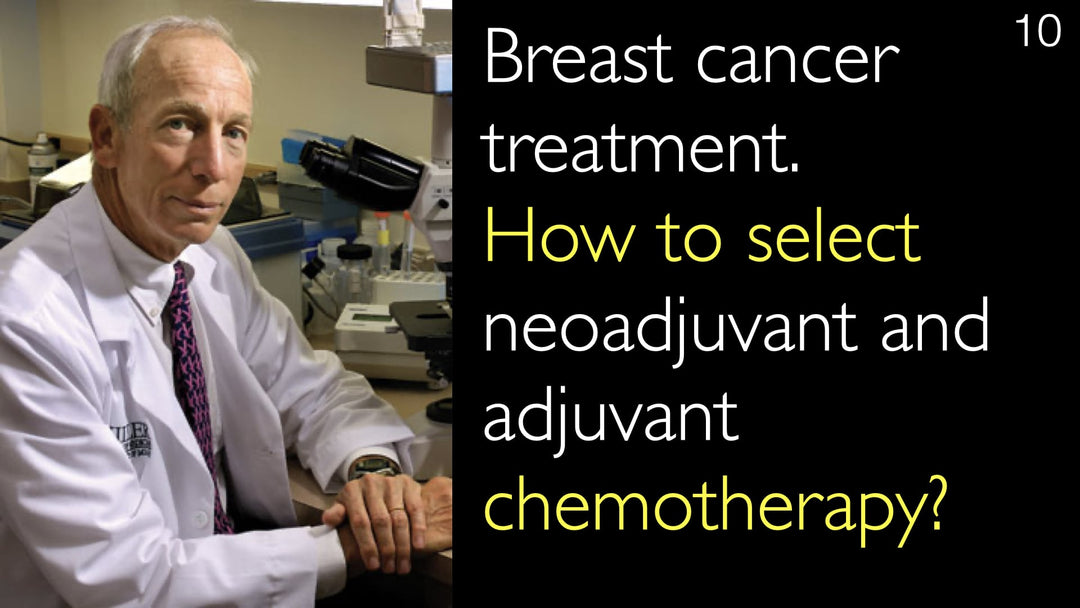Leading expert in breast cancer and early drug discovery, Dr. Giuseppe Curigliano, MD, explains the latest advances in treating hormone receptor-positive, HER2-negative breast cancer. He details the use of PI3K alpha inhibitors like alpelisib for patients with specific mutations and highlights the revolutionary potential of antibody-drug conjugates (ADCs) such as trastuzumab deruxtecan. These "Trojan horse" therapies deliver high-potency chemotherapy directly to cancer cells, improving efficacy while reducing toxicity. Dr. Curigliano also discusses the future of oral SERDs, which promise better quality of life and compliance for patients.
Advanced Treatments for Hormone-Positive, HER2-Negative Breast Cancer
Jump To Section
- PI3K Inhibitors for Mutated Breast Cancer
- What Are Antibody-Drug Conjugates?
- How Antibody-Drug Conjugates Work
- Future Clinical Trials for ER-Positive Breast Cancer
- The Promise of Oral SERD Therapy
- The Agnostic Approach to Cancer Treatment
PI3K Inhibitors for Mutated Breast Cancer
For patients with hormone receptor-positive, HER2-negative breast cancer, a significant new treatment option involves targeting specific genetic mutations. Dr. Giuseppe Curigliano, MD, explains that approximately 41% of these patients have a mutation in the PI3K pathway. For this patient population, the alpha-selective PI3K inhibitor alpelisib, combined with the endocrine therapy fulvestrant, has been shown to improve progression-free survival. This represents a move towards more personalized, biomarker-driven treatment strategies for advanced breast cancer.
What Are Antibody-Drug Conjugates?
A revolutionary new class of medications for breast cancer treatment is antibody-drug conjugates (ADCs). As Dr. Giuseppe Curigliano, MD, describes, these include drugs like sacituzumab govitecan, trastuzumab deruxtecan, and ladiratuzumab vedotin. These complex molecules are designed to combine the precision targeting of a monoclonal antibody with the potent cell-killing power of chemotherapy. Their development marks a significant shift in how oncologists approach delivering cytotoxic agents.
How Antibody-Drug Conjugates Work
The mechanism of action for antibody-drug conjugates is elegantly simple yet highly effective, often described as a "Trojan horse" strategy. Dr. Giuseppe Curigliano, MD, explains that the antibody component is engineered to seek out and bind to a specific signal, or antigen, on the surface of a cancer cell. Once bound, the entire complex is internalized by the cell. The antibody is conjugated to a very high payload of chemotherapeutic agents, which are then released directly inside the cancer cell. This targeted delivery spares normal, healthy tissue, resulting in a higher therapeutic index and significantly lower overall toxicity compared to traditional chemotherapy.
Future Clinical Trials for ER-Positive Breast Cancer
The application of antibody-drug conjugates is expanding into new patient groups through ongoing clinical research. Dr. Giuseppe Curigliano, MD, highlights the DESTINY-Breast06 trial, a prospective randomized clinical trial for ER-positive breast cancer patients who have progressed on CDK4/6 inhibitors. In this study, patients are randomized to receive either the ADC trastuzumab deruxtecan—even if they have only very low expression of the HER2 antigen—or standard chemotherapy chosen by the investigator. This trial could redefine treatment sequencing and biomarker testing for this large group of patients.
The Promise of Oral SERD Therapy
Beyond antibody-drug conjugates, the future of endocrine therapy for hormone-positive breast cancer is evolving. Dr. Curigliano points to the development of new oral Selective Estrogen Receptor Degraders (SERDs). These next-generation medications perform the same function as existing injectable endocrine therapies but can be taken orally. This shift to an oral formulation is expected to greatly improve a patient's quality of life and measured compliance with their long-term treatment regimen, which is crucial for managing this chronic disease.
The Agnostic Approach to Cancer Treatment
The innovation of antibody-drug conjugates is part of a broader, transformative trend in oncology known as a "tumor-agnostic" or "histology-agnostic" approach. As discussed by Dr. Giuseppe Curigliano, MD, this strategy involves treating cancer based on the specific molecular characteristics of a tumor rather than solely on its tissue of origin. While radiopharmaceutical conjugates have been used in this way for other cancers, Dr. Curigliano is confident that a similar, biomarker-driven approach will become a standard part of breast cancer treatment in the near future, offering new hope for patients with advanced disease.
Full Transcript
Dr. Anton Titov, MD: You lead the Early Drug Discovery Program at the European Institute of Oncology and focus specifically on breast cancer treatment and other solid tumors. Could we discuss the advances in breast cancer treatment in three major situations? The hormone receptor-positive breast cancer, the HER2-neu positive breast cancer, and triple-negative breast cancer, which historically has had a very challenging prognosis. Perhaps we could start with the estrogen and progesterone receptor-positive breast cancer, but HER2/neu-negative breast cancer. What is new on the horizon in treatment for those breast cancer patients?
Dr. Giuseppe Curigliano, MD: What we can mention about those patients is the opportunity to use PI3 Kinase alpha-selective inhibitors. We know that 41% of those patients are PI3K kinase-mutant. In this patient population, you can combine Alpelisib, which is an alpha-selective PI3 kinase inhibitor, with fulvestrant. This leads to the improvement of progression-free survival.
I must confess that in the future, also in ER-positive breast cancer, you may have the opportunity to use antibody-drug conjugates. Actually, there is a prospective randomized clinical trial ongoing (DESTINY-Breast06) for those patients who progress to CDK4/6 inhibitors. They are randomized to trastuzumab deruxtecan if they have too low expression of HER2/neu antigen. Another clinical trial arm is chemotherapy at the investigator's choice.
So these are breast cancer treatments on the horizon that we may have in a short time. We may have these breast cancer therapies in five years, maybe the new oral SERDs (Oral Selective Estrogen Receptor Degraders). Specifically, these are estrogen receptor degraders that can be taken orally with a better quality of life and measured compliance for patients.
Dr. Anton Titov, MD: This is very interesting. You mention a completely new sort of drug-conjugates, antibody-drug conjugate medications. What are antibody-drug conjugates?
Dr. Giuseppe Curigliano, MD: Specifically, antibody-drug conjugates are sacituzumab govitecan, trastuzumab deruxtecan, and ladiratuzumab vedotin.
Dr. Anton Titov, MD: And what is the principle behind this new class of breast cancer medications?
Dr. Giuseppe Curigliano, MD: It is like a Trojan horse. You target a specific signal on the breast cancer cell. The antibody is conjugated with a very high payload of chemotherapeutic agents that will go directly into the cancer cells, sparing the normal tissue. So you will have a higher therapeutic index and lower toxicity of breast cancer chemotherapy.
Dr. Anton Titov, MD: That seems like a very revolutionary paradigm. There are also antibody conjugates with the locally-acting radiopharmaceuticals. They have already been used in medicine.
Dr. Giuseppe Curigliano, MD: This is a new approach to cancer treatment. We can call it the agnostic approach. I am quite sure that in the future, we will have a similar approach also in breast cancer.







